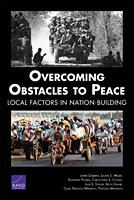| 来源类型 | Research Reports
|
| 规范类型 | 报告
|
| ISBN | 9780833078605
|
| 来源ID | RR-167-CC
|
| Overcoming Obstacles to Peace: Local Factors in Nation-Building |
| James Dobbins; Laurel E. Miller; Stephanie Pezard; Christopher S. Chivvis; Julie E. Taylor; Keith Crane; Calin Trenkov-Wermuth; Tewodaj Mengistu
|
| 发表日期 | 2013
|
| 出版年 | 2013
|
| 页码 | 348
|
| 语种 | 英语
|
| 结论 |
Nation-Building Interventions Do Not Need to be Transformative to Achieve Their Main Objectives- Transformation of many of the specific conditions that gave rise to or fueled a conflict often is not feasible in the time frame of nation-building operations. But such broad transformation has not proven essential to achieving the primary goal of nation-building — establishing peace.
- The countries that were better off to begin with institutionally and economically were better off at the conclusion of nation-building interventions than those that started out with greater limitations. Nevertheless, they were almost all meaningfully better off than when these operations began.
- Nation-building operations that have enjoyed local consent and regional support almost always have achieved peace.
The Benefits of Nation-Building Interventions Have Exceeded the Costs- Most interventions in the past 25 years have been followed by improved security, some degree of democratization, significant economic growth, and modest improvements in human development and government effectiveness.
- These outcomes have been achieved in most cases with only a modest commitment of international military and civilian manpower and economic assistance.
Modifying Geopolitical Circumstances and Co-Opting Patronage Networks Are Crucial Steps Toward Establishing Enduring Peace- In the six case studies, the regional or global situation had a profound effect in fomenting or sustaining the conflicts, and changing those situations was crucial to the enduring termination of conflicts.
- The international community had considerable success in altering the geopolitical sources of conflict in each of the six cases, but it had much less success in weakening the hold of patronage networks that were competing for wealth and power.
- Patronage networks often were co-opted into power-sharing arrangements that produced peace and even some modicum of democracy, but they could almost never be persuaded to support institutional and policy reforms that would curb their own rent-seeking capacity.
|
| 主题 | Bosnia and Herzegovina
; Cambodia
; Democracy
; El Salvador
; Global Security
; Nation Building
; Peacekeeping and Stability Operations
; Sierra Leone
; Southeast Asia
; United Nations
|
| URL | https://www.rand.org/pubs/research_reports/RR167.html
|
| 来源智库 | RAND Corporation (United States)
|
| 资源类型 | 智库出版物
|
| 条目标识符 | http://119.78.100.153/handle/2XGU8XDN/107589
|
推荐引用方式
GB/T 7714 |
James Dobbins,Laurel E. Miller,Stephanie Pezard,et al. Overcoming Obstacles to Peace: Local Factors in Nation-Building. 2013.
|
|
文件名:
|
x1495316260378.jpg
|
|
格式:
|
JPEG
|

|
文件名:
|
RAND_RR167.pdf
|
|
格式:
|
Adobe PDF
|
除非特别说明,本系统中所有内容都受版权保护,并保留所有权利。